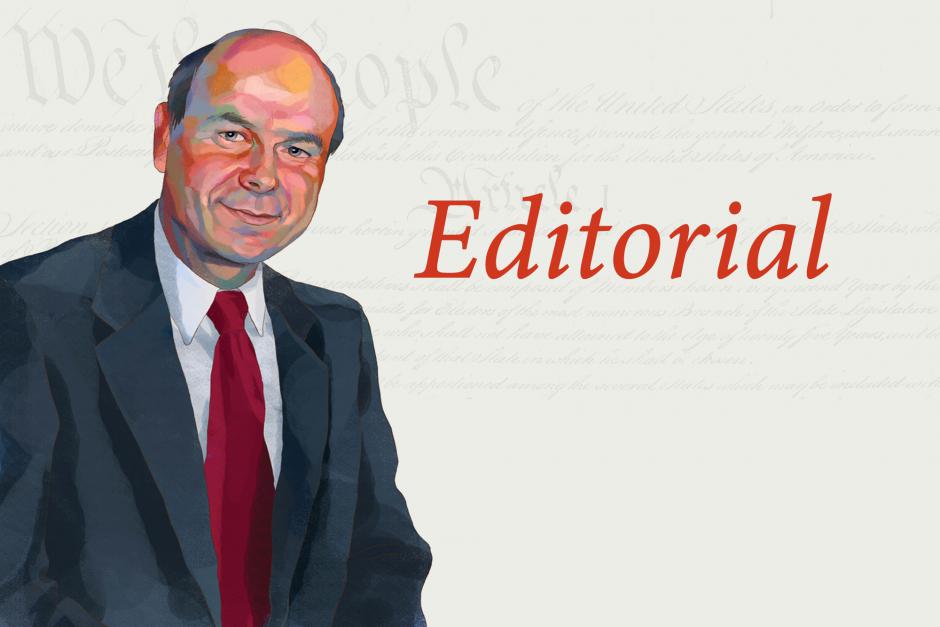Cause and Effect
Lincoln E. Steed March/April 2017And there shall be wailing and lamentation in the land” might sound biblical or like something out of the faux reality conjured up in The Lord of the Rings and its ilk. Unfortunately, my adaptive quote was in many ways an apt descriptor for the attitude of many as 2017 got under way. A watershed presidential election is over, and, wonder of wonders, the new administration rapidly begins to fulfill its election promises. That in itself is almost a political oddity, as we have become so used to empty political rhetoric that most people expect the promised winds of change to blow over once the polls close.
I know that the sackcloth-and-ashes metaphor applies only to the losers, and that for those who voted us here, this is a great moment. And greatness is always possible, even from turbulent beginnings (as any insightful look back at the American Revolutionary experience might reveal).
This magazine has never been invested in any particular political viewpoint, let alone captive to a political party. Our position has not changed: we defend religious liberty from a constitutional, legal, historic and biblical presumption. But those once-clear markers have been obscured of late.
Shortly after his confirmation as attorney general, once-senator Jeff Sessions announced that he did not support a separation of church and state. For some this came as a real surprise. For anyone watching the evolution of church-state discussion among Evangelicals, this is where they have been for some time. Seemingly unaware of the irony that an unwillingness to allow church-state separation has proved to be the singular motivator of radical Islam, a critical mass of Christian leaders in the United States thinks the answer to moral and political malaise lies in a Christian political agenda. Again this magazine has cautioned against this for decades. While we share all of the concerns of this group, we are jealous to protect the state from religious intrusion—and vice versa—and have always proclaimed the need for a broad-based spiritual renewal.
Proof of the direction this dismissal of Jefferson’s take on the First Amendment through his comments on the Virginia Statute, which was its model, is found in the eager embrace of an administration intent to undo the Johnson Amendment of 1954. That legislation was a reflex attack by Johnson on the churches who supported his political opponent. That alone should warn would-be church politicos that overt church politics will invite punishment. Unfortunately, 1954 was also the year of the Supreme Court ruling in Brown v. Board of Education, which was a major salvo in the opening of the civil rights movement. Unfortunately, I think it arguable that part of the reasoning in the Johnson Amendment was to restrict Black churches and empower White Southern Protestants who opposed the whole movement. Johnson himself later rose above it all and carried through civil rights and Great Society legislation. Removal of the Johnson Amendment will likely result in competing religio-political agendas and will tempt the powers that be to restrict those that they find offensive. It is far better to have all religious powers nonpartisan but vocal moral forces.
The so-called Muslim ban of course generated massive reaction both within the United States and internationally. More than concrete, it showed the wall going up and the symbolic fading of Emma Lazarus’ fine words under the Statue of Liberty. There is no question the rushed-through order gave the appearance of religious prejudice. And a number of public statements by principals might easily confirm that they hold a certain prejudice. But in spite of the Ninth Circuit stay invoking the establishment clause, the order was not worded against faith identity and had a certain national security logic to it that many are still ignoring. My worry is that by invoking the First Amendment so easily, the argument may weaken against later more overt religious exclusion sure to come as the Johnson Amendment fades into history and certain religious viewpoints take up a privileged place in public policy.
This is a time of rough and tumble for the United States generally. The election of 2016 may have shocked both winners and losers by its tone and radical transformation, but it was not as random as might appear.
Unacknowledged inflation and job stagnation since 2008 have demoralized millions who remain unconvinced that the good times are back. Very public political obstructionism has long angered many voters. Crime and domestic terrorism, played on endless loop news, have created a deep angst in many. Distant and continuous war may not much bother a citizenry represented by a volunteer military, but the daily exultation of the military nomenclatura has created a new readiness to order a world that is resisting our goodness. In toto, these and other unenumerated frustrations have destabilized the social order and, I would posit, even threaten the social contract.
This is the perfect moment to whisper our prayers for divine guidance and to demand that we all—leaders and we the people who empower them—reread our history, reexamine our principles, and, for God’s sake, take the time to reread the Constitution.
Article Author: Lincoln E. Steed
Lincoln E. Steed is the editor of Liberty magazine, a 200,000 circulation religious liberty journal which is distributed to political leaders, judiciary, lawyers and other thought leaders in North America. He is additionally the host of the weekly 3ABN television show "The Liberty Insider," and the radio program "Lifequest Liberty."
